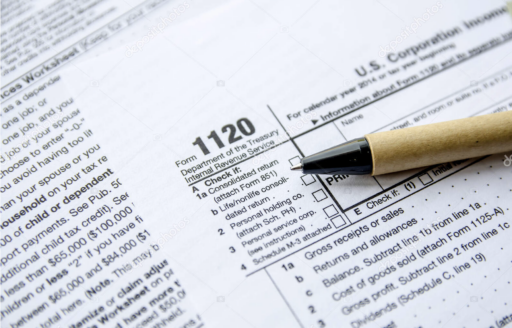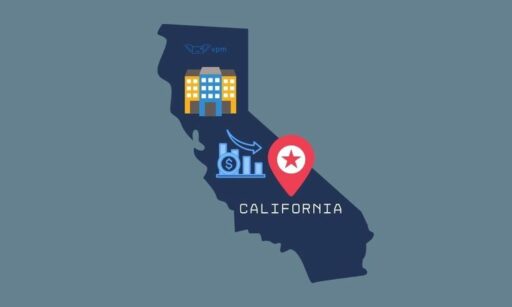How does your state stack up in terms of tax rates? Check out this ranking from best to worst for each state tax rate.

Note: A ranking of 1 is best, 50 is worst. Percentage values are corporate tax rate by state. D.C.’s score and rank do not affect other states. The report shows tax systems as of July 1, 2022 (the beginning of fiscal year 2023)
Source: Cleer Tax
50-State Guide To Taxes – A Business Tax Guide By State
Here is our list of corporate tax rates by state, including rules and conditions for each, as well as a rundown of income tax states. Bookmark this handy state corporate tax guide and our corporate tax by state blog to ensure you stay aware of the rules, conditions, and changes to the State Tax Nexus.
“The hardest thing in the world to understand is the income tax.” -Albert Einstein
While Einstein may have been the greatest scientific mind we have ever known, even he was daunted by the complexity of the US tax system. A big portion of this complexity comes from the separation of state and federal governments and how both have separate powers to tax.
Then, there are the multiple levels of taxes on all kinds of transactions and on worldwide income. And nowhere do I find clients get as confused as they do when it comes to the differences in the corporate tax rate by state taxes – income and sales taxes.
We have created a detailed 50-State Guide to Taxes to help you understand the corporate tax rate by state, available for free download at this link.
Keep in mind that this information changes frequently. We update this page regularly to have the most current information, but there still may be changes beyond what we’ve seen, so always check the resources directly from your state when filing corporate income taxes. But if you want to understand the general topics, we have included some basic information here to understand how these taxes are assessed.
What is the Difference Between State Income Tax and Sales Tax?
Income tax is tax paid on the net income after all expenses have been calculated. Sales tax, on the other hand, is tax paid on the gross sales amount. Income tax is paid by the company or individual who sells something to the IRS, whereas technically, the sales tax is paid by the purchaser of the good or service but collected and remitted by the seller. Thus, state income tax is usually based on where the company is operating, and sales tax is based on where the purchase is made. But as in all things regarding taxes, it is not logical, and things are no longer this simple.
What is State Income Tax Nexus?
In general, “establishing nexus” means that a business has a substantial enough presence in any particular state for that state to have taxing authority. If a business has activity in a state and has income earned within that state, it may have a requirement to pay tax in a state, regardless of whether it is registered to do business in that state. Having a physical presence in the state will normally trigger this nexus automatically, but increasingly, states have economic presence standards that mean many companies unknowingly have nexus in additional states.
Aren’t There Constitutional Limitations on State Income Tax?
Yes, the U.S. Constitution places limitations on a state’s jurisdiction to tax. These constitutional limitations derive from two clauses in the U.S. Constitution: the Due Process Clause, in Amendment XIV, Section 1, and the Dormant Commerce Clause, taken from Article 1, Section 8. The nexus requirement of both clauses must be satisfied before an out-of-state business may be subject to tax jurisdiction within a particular state.
There was a Supreme Court case in 2018, South Dakota v. Wayfair, that basically turned the traditional nexus treatments upside down. While this case had sales taxes as the subject matter, it opened a Pandora’s Box in the tax world, allowing states to redefine who is taxable when doing business in their boundaries, both for income and sales tax purposes.
What is the Due Process Clause?
The Due Process Clause is the part of the Constitution that ensures the government cannot deny anyone life, liberty, or property without following certain reasonable procedures. Due Process Clause nexus is satisfied when a person has minimum contact with a state such that maintenance of a lawsuit against the person would not offend “traditional notions of fair play and substantial justice.” This legalese statement is quite a protection for individuals, but when applied to businesses, it is really broad because if you are selling to someone in a state, then there probably is some precedent of how that consumer can sue you.
Due process clause nexus is satisfied when the person has a physical presence in a state, but physical presence is not necessarily required to establish Due Process Clause nexus. Even without a physical presence in the taxing state, the Due Process Clause nexus is satisfied when an out-of-state company’s marketing is purposefully directed toward residents of the taxing state.
This can open up income tax nexus to companies merely from running ads in a state and using a state address on your website. Some states have even taken the position that just by offering products or services online that are available to residents of that state, a company does business there. Thus, in the world of eCommerce and SaaS platforms, no web-based company is safe.
What is the Dormant Commerce Clause?
The Commerce Clause is the part of the constitution that gives the federal government power to regulate disagreements between the states. The Dormant Commerce Clause refers to the prohibition, implicit in the Commerce Clause, that prevents states from enacting laws that hurt interstate business. The Dormant Commerce Clause limits the reach of a state taxing authority to ensure that state taxation does not unduly burden interstate commerce. A state tax will satisfy the Dormant Commerce Clause if it meets ALL of the following four requirements:
- The tax is applied to an activity with a substantial nexus with the taxing state.
- The tax is fairly apportioned.
- The tax does not discriminate against interstate commerce.
- The tax is fairly related to services provided by a state.
The Dormant Commerce Clause “substantial nexus” requirement is not satisfied when the only contacts of a vendor of tangible goods with the taxing state are by mail or common carrier. However, the substantial nexus requirement can now be overcome in certain cases by showing a “significant economic presence.” What actually rises to “significant economic presence” varies a lot from state to state. Some states set this threshold to where even $1 in sales theoretically creates a nexus. These thresholds have yet to be argued meaningfully in the court system to set precedents for the states to follow.
What is the Salesperson Exception?
There is one historical exception to the nexus requirements that still applies, for salespeople operating out of state. This law, PL 86-272, places additional limits on a state’s ability to tax interstate commerce. PL 86-272 prohibits a state from taxing the income of an out-of-state corporation whose only business activities within a state are “solicitation of orders” for tangible personal property, provided that the orders are sent outside a state for approval by a head office, and the tangible personal property is delivered from out of state. Basically, if you have a team of traveling salespeople and you are selling a product, then you are in the clear.
However, this exception is very narrow and really doesn’t apply to any web-based business models like SaaS because it doesn’t cover leased property. It also doesn’t apply to any service business or even to revenue from servicing goods that are sold in the state. And if the person doing sales is also a director or officer of your company, it also probably won’t apply. However, if it applies to the context, this law covers employees and independent contractors working in a state, but with slightly different rules for each.
In July 2020, the Multi-State Tax Commission (MTC) issued a restatement on when PL 86-272 applies in the digital economy. As per the MTC’s restatement, a number of activities that would have previously been considered protected may now create a nexus. Examples of digital activities that violate PL 86-272 include providing customer support via online chat tools, extended warranty plans, advertising job openings, accepting job applications through the Company website, putting specific types of cookies into customers’ devices, and providing remote repairs and automatic device updates.
California has already adopted the MTC’s restatement, and other states are sure to follow, although the California law has been challenged in court as of August 2022, so it remains unknown if this will actually be upheld.
What About Sales Tax Nexus?
Sales tax nexus is completely different from income tax nexus. While income tax nexus is focused on the operations of the business, including where the business is registered, headquartered, and where it markets and sells its goods and services, sales tax nexus is based on where the buyers are located. Thus, if you sell a good or service to someone in a particular state, there may be a sales tax nexus, even if there is no income tax nexus.
How is E-Commerce Taxed?
The Supreme Court case mentioned earlier, South Dakota v. Wayfair, changed how states treat sales taxes. This case overturned an earlier longstanding precedent that required a company to have a physical presence in a state in order to collect tax there. Justice Anthony Kennedy, writing for the majority, suggested that South Dakota’s law would survive scrutiny under the Dormant Commerce Clause due to parts of the law that intended to avoid undue burdens on interstate commerce.
This included a safe harbor for small sellers, a lack of retroactivity, single state-level administration, uniform definitions of products and services, and software for sellers with immunity for any errors arising from reliance on it. Not all states have followed this guideline, and sometimes small sellers are taxed at an early level with the new state rules, but most states have some reasonable exemptions, at least for sales taxes.
There is an exception for sales of goods that are delivered from out of state or out of the country via common carrier. However, if you use drop-shipping or an FBA-type service, you may be subject to sales tax if the drop shipper has facilities in the state where the goods are stored prior to the final delivery to the customer. The same is true for employees and agents in the state; this can create a sales tax obligation to sales within that state if you have workers in that state and need to register for state income tax purposes, as then you are doing business in that state.
How are Software and SaaS Companies Taxed?
Software is a little tricky for sales tax purposes because it originally was considered tangible personal property when sold on discs in a store, but now is downloaded, or is a subscription, as a Software as a Service (SaaS) product. Thus, there are many gray areas and every state has different rules as to how they treat this. Currently, about half of all US states have some sort of a sales tax on SaaS purchases.
How are Online Marketplaces Taxed?
Marketplaces have also been targeted in the post-Wayfair tax world. The vast majority of states now have Marketplace Facilitator Sales Tax laws that require online marketplaces to collect and remit sales taxes on behalf of their sellers, with extremely low economic nexus thresholds. This can be a substantial burden to launching a new marketplace as from the beginning compliance must be met on nearly all sales.
Eliminate the Confusion of Understanding Corporate Tax Rate by State with Cleer Tax
With so many rules and regulations constantly evolving, it can be complex trying to figure out the corporate tax rate by state. Let Cleer Tax guide the way so you can feel assured that your taxes are filed on time and the right way.
Want to Receive a Free Download of Our Guide to Tax Rates in all 50 States?
Click here!







